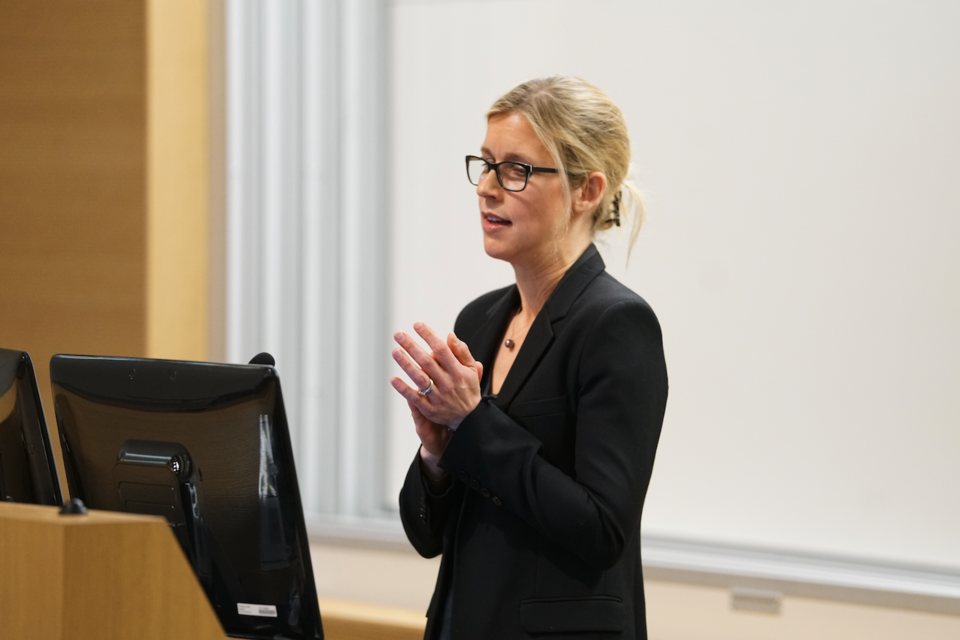Rheumatoid Arthritis
How Can We Better Treat Patients With Rheumatoid Arthritis?

Christina Charles-Schoeman, MD, MS
Associate Professor of Medicine
Chief, Division of Rheumatology
Patient-Centered Research
Dr. Christina Charles-Schoeman, the new Chief of the UCLA Division of Rheumatology, changes the lives of rheumatoid arthritis patients by studying the mechanisms driving the disease and conducting clinical trials. She hopes to better understand the disease, develop new treatments, and maybe even find a cure.
A chronic inflammatory disease affecting the joints, rheumatoid arthritis has no cure, although it's one of the most common autoimmune disorders in the world. As she and other researchers search for a cure, Dr. Charles-Schoeman strives to uncover novel therapies to better treat the disease and help patients live normal, functional lives.
Understanding Rheumatoid Arthritis
Patients get rheumatoid arthritis when their immune systems attack healthy tissue. Rheumatoid arthritis shares many mechanistic features with other autoimmune diseases (including diabetes and multiple sclerosis) characterized by unnecessary immune assaults on healthy tissue; a deeper understanding of rheumatoid arthritis could lead to a deeper understanding of a host of other autoimmune disorders.
While we understand the mechanisms through which the immune system attacks healthy tissue in cases of rheumatoid arthritis, we don't know exactly what triggers the immune attack, and therefore the disease, in the first place.
Along with other researchers in the UCLA Division of Rheumatology, Dr. Charles-Schoeman conducts interventional and observational studies to expand medical knowledge of rheumatoid arthritis and isolate the most effective treatments for the disease.
Dr. Charles-Schoeman has a particular interest in understanding why patients with RA suffer a marked increased risk of cardiovascular disease, which appears to be related to chronic inflammation.
Work by her lab group has shown that the function of lipoproteins carrying the so-called “good cholesterol” (high density lipoproteins or “HDL”) are abnormal in RA patients with active disease. The HDL particles in these patients are different in both their protein composition as well as their anti-inflammatory functions. This dysfunctional HDL may even promote, rather than prevent, inflammation in blood vessels and joints.
Through her studies of the interplay between lipid metabolism and rheumatoid arthritis, Dr. Charles-Schoeman has found:
- When treatments work to reduce inflammation associated with rheumatoid arthritis, patients experience an improvement in HDL composition and function, as well as changes in cholesterol levels. Read more in Improvement of High-Density Lipoprotein Function in Patients With Early Rheumatoid Arthritis Treated With Methotrexate Monotherapy or Combination Therapies in a Randomized Controlled Trial and Association of Triple Therapy with Improvement in Cholesterol Profiles over Two Year Follow-up in the TEAR Trial, both published in Arthritis & Rheumatology.
- A novel mechanism (increases in cholesterol ester catabolism) may help explain changes in cholesterol levels in rheumatoid arthritis patients during therapy. Read more in Potential Mechanisms Leading to the Abnormal Lipid Profile in Patients with Rheumatoid Arthritis Versus Healthy Volunteers and Reversal by Tofacitinib, published in Arthritis & Rheumatology.
Dr. Charles-Schoeman hopes that a better understanding of inflammatory lipid pathways in patients with RA will not only reduce cardiovascular disease, but will also identify potential novel treatment targets for better, safer control of the arthritis itself.
A Bright Future for Patients with Rheumatoid and Other Autoimmune Diseases
Idiopathic Inflammatory Myopathies: Dermatomyositis and Polymyositis
In addition to her research and care of patients with rheumatoid arthritis, Dr. Charles-Schoeman is also dedicated to making a difference in the lives of patients suffering from a rare group of inflammatory muscle diseases, referred to as idiopathic inflammatory myopathies. These diseases cause marked muscle weakness and may be associated with rashes and other multi-organ damage including life-threatening lung disease. Dr. Charles-Schoeman and her research team are currently growing one of the largest groups studying and treating inflammatory myositis on the West coast.
As long as a cure for rheumatoid arthritis and myositis remains a hope, Dr. Charles-Schoeman is more than happy if the treatments she currently uses can make patients forget they are suffering from a disease.
In the video to the left, Dr. Charles-Schoeman discusses a patient whose treatment works so well, he forgets he even has a disease.
For Dr. Charles-Schoeman, it all comes down to the patients. Helping them drives her innovation—and her hope for a future of even more advanced care of patients with rheumatoid arthritis and myositis.
Support UCLA's Division of Rheumatology
For additional assistance regarding donations, please contact:
Jennifer Brown
UCLA Health Sciences Development
(310) 206-2435
jbrown@support.ucla.edu
Patients with RA not only suffer chronic pain from their arthritis, but they may also have other symptoms including severe fatigue, which impair their daily activities. Finding the right RA therapy to treat all of these symptoms in the individual patient is critical.
Christina Charles-Schoeman, MD, MS